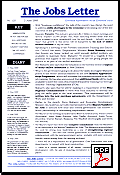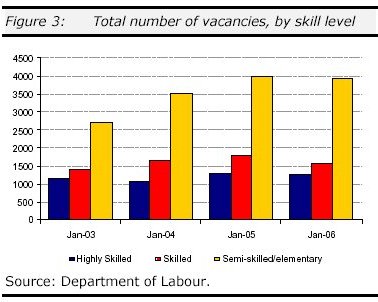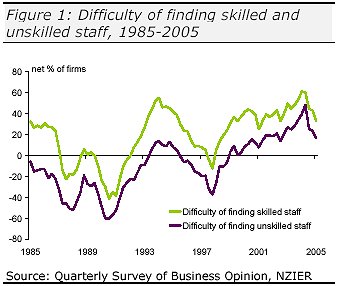



|
 |

|
| No.249 | 31 March 2006 | Essential Information on an Essential Issue |
of key events over the last few weeks. WORKING FOR FAMILIES WELFARE PAYMENTS ADJUSTED FOR INFLATION SPECIAL FEATURE: THE DAVID BENSON-POPE INTERVIEW 90-DAY JOB PROBATION DEBATE FRANCE BESIEGED BY NEW YOUTH UNEMPLOYMENT PROTESTS EMPLOYERS WARNED SKILLS SHORTAGE HERE TO STAY JOB VACANCY ADS DECLINING NOT ALL PERMANENT RESIDENTS STAY SINGLE BENEFIT THREATENS BLIND WORKING PEOPLE PACE SCHEME SLOWING NZERS POURING INTO AUSTRALIA  LAST Letter
LAST Letter
NEXT Letter   Download this issue as a PDF file
Index to Features
5 March 2006In Australia, 27 companies face a writ which claims they are paying sewing machinist outworkers as little as A$3 an hour, in breach of minimum pay legislation. The shortage of nurses in wealthy countries is leading to a health-care system collapse in the Philippines, where over 100,000 nurses — and doctors taking jobs as nurses — have left the country for higher wages overseas. 6 March 2006The Child, Youth and Family Service is to be merged into the Ministry of Social Development. 7 March 2006NZ students struggle to pay the cost of living under the current youth wage, let alone the cost of their education, according to the Association of Staff in Tertiary Education. NZers thinking about moving to Australia should think again, according to PM Helen Clark. Clark says Australia has higher taxes, higher property prices, higher unemployment. Canada will not be able to benefit from a boom in the mining industry if something is not done to face the growing labour shortage in the sector, according to the British Columbian Mining Association. President Michael McPhie. The industry is working with the government to try to provide solutions that include increased funding to universities, bulking up trade schools, hiring more women and hiring more immigrants. Canadian province British Columbia is creating a strategy to attract immigrants to deal with its skill shortages. It plans to streamline the immigration process for skilled migrants hiring " job coaches" to guide immigrants into a job. In the UK, new immigration rules will see highly skilled immigrants able to gain residency in the UK after working only two years on a working visa. Low-skilled workers will be restricted unless a skills shortage is identified in particular sectors. 8 March 2006An extra 31,000 trades training places are to be offered throughout Queensland as part of a $1 billion plan by the Federal Government to tackle skills shortages. Brisbane-based Trade and Technical skills Institute will take control of the development of training in building and construction, automotive, electrical, manufacturing and engineering trades. 9 March 2006The Economic Development unit for South Canterbury hopes to attract at least 25 British immigrants and their families to South Canterbury when representatives attend NZ Immigration Expos in Manchester and London later this year. 10 March 2006Youth rates are voluntarily scrapped at 90 BP-owned service stations around NZ, ahead of any pending legislative change in parliament. Britain's armed forces face "serious manning shortfalls" in 80 key operational areas. A report by the Armed Forces Pay Review Body reveals that some army units are already so overstretched that they "routinely breach" guidelines on the amount of tour duty considered healthy. 11 March 2006Hospital care and aged-care workers launch a campaign to seek better pay, claiming their members are living on the poverty line. Australia's Prime Minister John Howard says the government is considering cutting welfare payments to Aboriginal parents whose children skip school. 12 March 2006A third of NZ and Australian businesses expect to spend more on information technology this year than last year according to a survey by research firm Forrester. Qantas says it will forgo up to $A30 million in annual profits as it elects to keep wide-body jet maintenance operations in Australia. Chief executive Geoff Dixon: "It's a compromise, but then you have a brand issue here and a responsibility to the community. We also have a huge workforce with major skills, and our view would be to keep those skills here." The skills most lacking in new employees in the US are professionalism, the ability to analyse, business knowledge and written and verbal communication are, according to the 2006 Access to Human Capital and Employment Verification Survey which also found that many organizations are recruiting skilled workers from overseas to fill these skills gaps. The report can be found here. 13 March 200659 jobs will be lost at Fonterra's Claneboye factory in South Canterbury as the company prepares to move some processing work to other locations. 14 March 2006The NZ$ slumps to a 20 month low of US63c. In a bid to attract skilled migrants, the NZ government exempts immigrants from paying NZ tax on most of their foreign income for four years. Returning expatriates need to have been living out of NZ for 10 years to qualify for the tax exemption. Only two of the top 20 universities in the world are situated in Europe, according to a survey by the OECD. Researcher Andreas Schleicher says there is no way that Europe can stop developing countries from producing "wave after wave of highly skilled graduates". Schleicher warns EU members to increase spending on schools and universities and tackle a crippling lack of social mobility within their societies or put future economic growth in jeopardy. 15 March 2006Top-end professional work in Australia is increasingly being handled overseas. A report by the Prime Minister's Science, Engineering and Innovation Council is evaluating threats to Australia from the emerging knowledge-based economies of China and India. Two US senators urge President George Bush to move forward with a free trade agreement with NZ. Republicans John McCain and John Sununu say the agreement would strengthen ties between the two countries. 16 March 2006District Health Boards are criticised for wasteful overseas recruitment spending after 10 boards flew up to five staff members each to attend a London jobs expo. National MP Tony Ryall says the health boards are wasting money set aside for overseas recruitment by competing against each other instead of presenting a united front. A group of Indonesian fishermen who jumped ship in Dunedin gain an agreement to get back pay from their employers. A Maritime Union spokesperson said the fishermen not only jumped ship because of poor working conditions, some of them were also made to pay a bond of thousands of dollars to get the job in the first place. UK jobless claims rose more than expected in February after the economy slowed in 2005. 19 March 2006More than 11,500 NZers are unable to work and are claiming benefits because of stress or drug and alcohol abuse. While unemployment is at a low of 3.6% the number of sickness and invalid beneficiaries continued to grow at a rate of 2.7% last year and totalled 121,362 at the end of the year. NZ is the worst performing country in the OECD for productivity growth according to business historian Arnold Kransdorff. He says the fluid NZ labour market effectively drains organisations of knowledge. Kransdorff: "It is like reinventing the wheel, because the organisation can not learn from its own experiences." Around 9% of GPs intend to leave their general practice, go overseas within 5 years or leave medicine altogether, according to a survey by the Royal NZ College of General Practitioners. It warns the declining number of GPs leads to more hours of work for those staying in practice — making it harder to retain those still in practice and making it more difficult to recruit. 20 March 2006About 1,000 secondary school students stage a protest rally in Auckland, organised by a group called Radical Youth in support of abolition of youth rates Bill. A slowdown in the number of foreign students attending Australian universities is placing many universities in financial trouble, according to the Australian Department of Education. Six universities rely on overseas student fees for more than 20% of their total income. 21 March 2006The jobs of 1,600 Air NZ airport services staff may be under threat after the airline wrote to six suppliers requesting information to benchmark their operations against their own. Falling enrolments are hitting all three Waikato tertiary institutes. Wintec, Waikato University and the School of Maori and Pacific Development all face serious enrolment problems. Britain raises its minimum wage by 6%. 22 March 2006Truancy services in NZ will be cut from 120 to 14 under a reform the Ministry of Education says will ensure consistency between services. South Taranaki truancy officer Stephen Dyer argues that the "good work and regard" achieved by workers in smaller areas will be lost. French Prime Minister Dominique de Villepin, embattled over his First Job Contract law, says withdrawal of the legislation is impossible but hints that the government could be flexible in "those sectors where it would be most relevant". 23 March 2006An initiative to help people who are on Sickness and Invalid Benefit into work is extended to Taranaki. PATHS (Providing Access To Health Solutions) is aimed at fast-tracking health services to beneficiaries who have health problems preventing them from working. Dutch women who choose not to work should pay back the cost of their education, according to an opposition politician. Sharon Dijksma: "You enjoy an expensive education, paid for by society, and you cannot throw away this knowledge without a penalty". 24 March 2006The Ministry of Immigration extends the period for seasonal horticultural and viticulture work visas. Visas had been offered from December to July but are now being offered through to September. One-third of students from decile one schools leave with no qualification. Decile one schools are those rated as having the lowest socioeconomic background. The NZ economy shrank by 0.1% in the last quarter of 2005. The NZ dollar, which was trading at nearly US70c a few months ago, is trading at just over US60c.
 LAST Diary
LAST Diary
NEXT Diary 
|
WORKING FOR FAMILIESThe changes are part of the $1.6 billion Working for Families package. The government is sending out 535,000 brochures to households explaining the changes and Minister of Social Development and Employment David Benson-Pope encourages people to read the brochure to see if they qualify for new payments. But St John says that because the changes are targeted only at people in work, 230,000 children in the poorest families in New Zealand will receive nothing. St John: "Child poverty can only deepen for those in families left out. Children's needs do not change because their parents do not work. The all-or-nothing In Work Payment will create a double jeopardy. When incomes fall as a result of job losses or reduced work hours, the child-based In Work Payment will also disappear". CPAG researcher Donna Wynd also questions the very logic behind the In Work Payment. "If this payment is needed as a work incentive, then why are people without children left out? If this payment is about rewarding work then why is it based on how many children people have? The In Work Payment is complex, discriminatory and unfair." Source — Media release NZ govt by David Benson-Pope, 10 March 2006, "Important information for families"; media release by CPAG, 28 March 2006, "Families will get much needed boost — but child poverty set to deep"; media release Dr Susan St John, 30 March 2006, "Child poverty worsens amongst the poorest".
WELFARE PAYMENTS ADJUSTED FOR INFLATIONSource — Media release NZ government by David Benson-Pope, 12 March 2006, "Minister has more good news for 1 April"; media release Green Party by Sue Bradford, 16 march 2006, "Minister hides benefit cut in `good news' smokescreen".
90-DAY JOB PROBATION DEBATE The 90-Day Probationary Employment Bill has been sent to Select Committee after passing
its first reading in parliament with a 63-58 majority. Sponsor of the Bill, National Party MP Wayne
Mapp, says the legislation would help young people — and people who have had extended periods out of
the workforce — to get jobs. The 90-Day Probationary Employment Bill has been sent to Select Committee after passing
its first reading in parliament with a 63-58 majority. Sponsor of the Bill, National Party MP Wayne
Mapp, says the legislation would help young people — and people who have had extended periods out of
the workforce — to get jobs.
Mapp acknowledges that two of the parties that supported the Bill — NZ First and the Maori Party — raised concerns about casual workers and discrimination. But Mapp points out that the Bill protects the right to holidays, doesn't compromise sick leave provisions and provides protection against serious discrimination. He says such issues will be fully canvassed at the committee stage and amendments could be added to address any concerns.
 Business NZ argues that the Probationary Employment Bill will help more people find
jobs. Chief executive Phil O'Reilly says employers can be understandably reluctant to employ people
without a positive employment record and the proposed legislation would help overcome the risks of doing
so. He says it would benefit teenagers, new migrants whose skills are often not well utilised, and
other groups whose unemployment rates exceed the average. O'Reilly says many small businesses are shy
of hiring untried workers because they have previously faced unjustified dismissal claims after terminating
a new employee. O'Reilly: "Often this is where someone has been hired in good faith, but where
the employment relationship didn't work out, where motivation, behaviour or work habits were
not appropriate, or where work output was below expectations. This is something that is hard to predict
in advance." Business NZ argues that the Probationary Employment Bill will help more people find
jobs. Chief executive Phil O'Reilly says employers can be understandably reluctant to employ people
without a positive employment record and the proposed legislation would help overcome the risks of doing
so. He says it would benefit teenagers, new migrants whose skills are often not well utilised, and
other groups whose unemployment rates exceed the average. O'Reilly says many small businesses are shy
of hiring untried workers because they have previously faced unjustified dismissal claims after terminating
a new employee. O'Reilly: "Often this is where someone has been hired in good faith, but where
the employment relationship didn't work out, where motivation, behaviour or work habits were
not appropriate, or where work output was below expectations. This is something that is hard to predict
in advance."
 The Council of Trade Unions says Maori shouldn't feel the need to grapple with a
perceived hierarchy of a "right to work" versus "workers rights". Vice president Sharon Clair says these things
are not incompatible, but the Bill attacks them both. Clair agrees that Maori unemployment is too high
but instead advocates for an investment approach that validates Maori potential. She says the key issues
in the labour market are how to get workers with skills, not how to sack them. Clair points out that
Maori unemployment has dropped significantly in recent years without a law that allows employers to
sack workers with no appeal rights. The Council of Trade Unions says Maori shouldn't feel the need to grapple with a
perceived hierarchy of a "right to work" versus "workers rights". Vice president Sharon Clair says these things
are not incompatible, but the Bill attacks them both. Clair agrees that Maori unemployment is too high
but instead advocates for an investment approach that validates Maori potential. She says the key issues
in the labour market are how to get workers with skills, not how to sack them. Clair points out that
Maori unemployment has dropped significantly in recent years without a law that allows employers to
sack workers with no appeal rights.
 The Green Party says the Probationary Employment Bill is an attack on the young, the
less skilled, the under-educated and the unemployed. MP Sue Bradford calls the Bill "mean-spirited"
and "anti-worker". Bradford: "What Dr Mapp and some other political parties supporting this Bill fail
to recognise is that it is already possible to have probation periods for new employees under the
existing Employment Relations Act. Where a probationary period has been negotiated, it can be taken
into account when looking at whether a dismissal is justified or not. What this Bill is really about is
stripping protections from the most vulnerable workers, those who tend to be less unionised and to have
less ability to negotiate their conditions when they start a new job. If Dr Mapp's Bill goes
through, employees will be sacked at will during the first three months on the job. Even worse, once
sacked, they become liable for a stand down of up to 13 weeks from Work & Income once they register
back in the benefit system. People will be scared to start jobs and scared to change them." The Green Party says the Probationary Employment Bill is an attack on the young, the
less skilled, the under-educated and the unemployed. MP Sue Bradford calls the Bill "mean-spirited"
and "anti-worker". Bradford: "What Dr Mapp and some other political parties supporting this Bill fail
to recognise is that it is already possible to have probation periods for new employees under the
existing Employment Relations Act. Where a probationary period has been negotiated, it can be taken
into account when looking at whether a dismissal is justified or not. What this Bill is really about is
stripping protections from the most vulnerable workers, those who tend to be less unionised and to have
less ability to negotiate their conditions when they start a new job. If Dr Mapp's Bill goes
through, employees will be sacked at will during the first three months on the job. Even worse, once
sacked, they become liable for a stand down of up to 13 weeks from Work & Income once they register
back in the benefit system. People will be scared to start jobs and scared to change them."
Source — The Mapp Report, 17 March 2006, "90-day probation bill passes first reading "; media release Business NZ, 15 March 2006, "Probationary period would help more into jobs"; Maori Party MP Pita Sharples speech to parliament on the Employment Relations (Probationary Employment) Amendment Bill, March 15 2006; media release NZ Council of Trade Unions, 16 March 2006, "`Right to Work' and `Workers Rights' Not Incompatible"; media release Green Party by Sue Bradford, 15 March 2006, "Nat's bill is attack on the vulnerable".
FRANCE BESIEGED BY NEW YOUTH UNEMPLOYMENT PROTESTS Meanwhile in France, in an attempt to alleviate youth unemployment, the French
government has passed legislation that makes it easier for employers to fire young workers. The measure creates
a First Job Contract (CPE) which provides a two-year probationary period for workers under 26
years old. This gives employers the right to dismiss young workers during their first two years on the
job without expensive legal and financial implications. The intention is that employers will be spurred
into hiring young people, safe in the knowledge that they are not legally obliged to retain them indefinitely. Meanwhile in France, in an attempt to alleviate youth unemployment, the French
government has passed legislation that makes it easier for employers to fire young workers. The measure creates
a First Job Contract (CPE) which provides a two-year probationary period for workers under 26
years old. This gives employers the right to dismiss young workers during their first two years on the
job without expensive legal and financial implications. The intention is that employers will be spurred
into hiring young people, safe in the knowledge that they are not legally obliged to retain them indefinitely.
But these measures are proving to be exceedingly unpopular among those it is meant to benefit. France has again been besieged by demonstrations with police estimating at least a half a million people have taken to the streets in protest against the CPE. And half of the country's 88 universities have been closed as students occupied buildings and disrupted normal operations. For more than ten years, France's unemployment rate has hovered at around 10% — one of the highest in Western Europe. But the level of unemployment for people under 25 years old has persisted above 20%, and is much higher than that among some ethnic groups. This is largely seen as the cause of the riots that erupted across France late last year. The lack of opportunities has left many young people desperate and frustrated about their future and created a huge brain drain as young French people, many of they well qualified, leave their country in search of opportunities elsewhere. Source — Guardian Weekly, 17-23 March 2006, "French Students revi8ve the spirit of 68" by Angelique Chrisafis; Fairfax, 19 March 2005, "Massive protests across France" by Reuters; New Zealand Herald, 20 March 2006, "Echoes of past in eruption of protest" by Catherine Field with additional reporting AFP.
EMPLOYERS WARNED SKILLS SHORTAGE HERE TO STAYWinter says the pool of people that employers in provincial centres had always been able to count on is simply no longer there and is not likely to reappear anytime soon. The biggest competitor these businesses face is urban drift. Headhunting for skilled young people from companies in larger centres — and from overseas — was becoming a growing reality, especially for places like Gisborne. Local employers can't rely on lifestyle factors to attract these people because the reality is that young graduates prefer the opportunities offered in urban centres. Winter says employers need to accept and adapt to the fact their workforce is ageing — and they must invest more in the people they already have. They can do this by enhancing the workplace environment and further developing their workers' skills. Winter says it is wrong for employers to think that if they invest in their staff, they might move on. The reality is that staff who are encouraged to extend themselves and become more responsible in their jobs get more satisfaction and are more likely to stay. Winter: "If you give people the room to develop and grow in the job, and they are the sort of people who like the lifestyle here, you will retain them." Source — Gisborne Herald, 9 March 2006, "Employers told skills shortage here to stay" by Marianne Gillingham.
JOB VACANCY ADS DECLININGSales assistants, general clerks and information clerks and receptionists are the most highly advertised jobs. 

NOT ALL PERMANENT RESIDENTS STAYThe study reveals many reasons why migrants leave after taking up New Zealand residency. One is that is a reflection of unsuccessful settlement, such as migrants not being able to find work or work they want to do. Others reasons are that they miss their home countries or their family who didn't come with them. Still others have on-going business commitments overseas. The study also points out that some migrants never have the intention of staying permanently, anyway. But the study also says many of the migrants who stay in New Zealand, even for a shorter amount of time, still make a valuable contribution while they are here. Source — New Zealand Herald, 22 March 2006, "Immigration looking up, latest numbers suggest" by Brian Fallow; Dominion Post, 22 March 2006, "NZ keeps losing its migrants" by Rebecca Palmer.
SINGLE BENEFIT THREATENS BLIND WORKING PEOPLE The government's intention to move towards a single benefit has alarmed those in the
blind community who have jobs. Currently, about 1,320 people receive a Blindness Benefit on top of
the wages they receive from their job. They fear that if the simplification of the benefit system continues,
the Blind Benefit will disappear — putting working blind people in the same abatement regime as all
other beneficiaries. The government's intention to move towards a single benefit has alarmed those in the
blind community who have jobs. Currently, about 1,320 people receive a Blindness Benefit on top of
the wages they receive from their job. They fear that if the simplification of the benefit system continues,
the Blind Benefit will disappear — putting working blind people in the same abatement regime as all
other beneficiaries.
The Royal NZ Foundation for the Blind believes this would be unfair, and has released research that supports the assertion that blind people who are in jobs have significant costs that other people don't have. The Cost of Blindness in New Zealand points out that key cost areas are related to carrying out domestic tasks, day to day travel, shopping, recreation and use of specialised equipment. The research estimates the living expenses of the country's 11,500 blind people costs them and their families $61 million more per year than it costs the non-blind population. Foundation chief Paula Daye points out the research can't be used to derive a meaningful average of cost per individual, but the research is the best ever done in New Zealand on the cost of blindness and should be useful for the government when considering any benefit changes. Daye: "Everyone involved in the blindness community knows that being blind or vision-impaired is expensive for individuals, families and society — in actual costs, time costs and opportunity costs." Foundation chairperson Don McKenzie says that if you are blind and employed, your costs go up, not down, because of adaptive technology equipment, transportation, and the like. McKenzie: "If the goal is to get more blind and vision-impaired people into employment, the Blindness Benefit must remain as it is. You don't want to penalise blind people for succeeding."
Source — New Zealand Herald, 21 March 2006, "Blind have to fork out extra $61 a year".
PACE SCHEME SLOWINGIn 2004, there were 1,960 people on PACE. In 2005, there were 1,182. This year, 901 people are registered on the programme. Source — The Press, 10 March 2006, "MP queries fall in artists leaving dole" by Beck Eleven.
NZERS POURING INTO AUSTRALIAThe New Zealanders moving to Australia are not just professionals or young university graduates looking to pay-off their student loans. Many have few, if any, qualifications and are struggling to make ends on the low-incomes they earn in NZ. They are drawn to Australia because they have family or friends who earn twice what they can in New Zealand doing low- or unskilled work. On average, real Australian incomes (adjusting for prices and the exchange rate) are 32% higher than NZ incomes. Others who leave for Australia do so because they find their skills are more welcomed there. Many highly experienced New Zealanders in their 50s who have been made redundant find that New Zealand employers are no longer interested in them. Australian employers appear to be much more accepting of older workers and appreciative of the contribution experienced people make. Still others are people who have migrated to New Zealand but can't find suitable work even though this country is suffering from serious skill shortages. The chairperson of the Migrant Support Services centre in Onehunga Shankar Nair points out it is no surprise New Zealand immigrants are turning to Australia, given the number of well-qualified migrants working at Auckland petrol stations. Source — New Zealand Herald hews series 21-22 March 2006, "To stay or go — its all down to money", Jobs luring young Maori across Ditch", "Higher wages big drawcard", "It's so much easier to make ends meet", "very different view from bottom of economic ladder", "Kiwis flocking to Oz yet again" all by Simon Collins. |